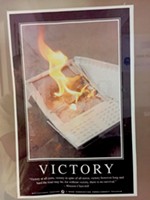Bedside Manner: Vampire vs. Zombie
That is the eternal question, is it not?
By Jay Trachtenberg, 7:00AM, Mon. Nov. 14, 2011
It was about a month ago that I was finally going to re-immerse myself in Dracula after all these years.
Back in 1997 when Bram Stoker’s horror classic was being celebrated for the centennial of its publication, I got about fifty pages in and, although utterly intoxicated by the use of language, somehow I got waylaid and never picked it back up. Coming across a nice used copy this fall to replace that old, battered paperback with its tiny print, I vowed to travel back to Transylvania in time for Halloween.
But before that journey could begin, Colson Whitehead’s new book, Zone One, arrived at work not long before the Texas Book Festival last month but, alas, too late to do any coverage on-air. I’ve been a big fan of Whitehead even since reading his stunning debut novel, The Intuitionist, a riveting metaphor on race in the guise of a young elevator inspector’s trials and tribulations. I’ve also read Whitehead's Apex Hides The Hurt, a light but insightful novel about the world of advertising that always seems to avoid mention when his oeuvre is discussed. The author’s most acclaimed book to date, John Henry Days, has been sitting in my bookcase for years waiting for the right moment to crack. So when Zone One, Whitehead’s stab at literary genre fiction in the form of zombie hunters in post-apocalyptic New York City, arrived at KUT, it was too hard to resist, especially with Halloween approaching. Dracula would just have to wait.
“So,” asked a work colleague, “is it an action-packed thriller with a breath-taking escape from zombies on every other page?” Ahhh, no, not hardly. In fact, there’s very little action, at least in the first half that I’ve read. Rather, Whitehead dissects the American socio-cultural landscape in context to the times both before the “plague” and via attempts to rebuild some semblance of a society after the mayhem. The main character is Mark Spitz (not his birth name) and it is through his eyes that we view this frightening world. Buffalo has become command central, giving orders to the street team of which Spitz is a member, trying to take back NYC one block at a time. The book’s title refers to an area in lower Manhattan around Chinatown that has been secured. It’s not a pretty place, with the majority of survivors suffering in some way from Post-Apocalyptic Stress Disorder (PASD). But Whitehead, a recent MacArthur fellow, provides a witty, perceptive, and certainly thought-provoking vantage point from which to experience this calamitous vision of the future.
Interestingly, this is at least the third novel I’m aware of in the past couple of years that takes a somewhat satirical view of a futuristic NYC in, if not a dystopian bent, then certainly a dysfunctional one. Both Jonathan Lethem’s 2009 Chronic City and Gary Shteyngart’s 2010 Super Sad True Love Story evoke more of an amused if unsettling take of the future than Whitehead’s clearly ominous apparition.
Although I’m not a big short story reader, oddly, there are three collections stacked up on my table at the moment. I was first introduced to the Sicilian writer Leonardo Sciascia about a decade ago when I read a terrific collection of four novellas called Open Doors. All were somehow related to crime although they weren’t exactly your typical crime stories and all involved institutional corruption of some sort. I was so taken by his stories that I immediately started to keep an eye out for any of his other work. It wasn’t until years later that I came across another of his books, a short story collection called The Wine-Dark Sea, found in a small independent coffee shop/book store in Baltimore. The anthology sat in my bookcase untouched for several years until recently. A band came to play on my KUT show and one of the musicians was named Sciascia. As it is an uncommon name I asked if he was related to the writer and he said all the Sciascias are related in some way as they all come from the same small region in Sicily. More importantly, he corrected my pronunciation of his name from the phonetic “ski-a-see-a” to the far more exotic “sha-sha.” Following that encounter, I immediately dusted off my copy of The Wine-Dark Sea and promptly read the first two stories and then put it down, where it has sat for the past couple of months. But at least now its within reach.
I also picked up John Jeremiah Sullivan’s new collection of essays, Pulphead. Again, I immediately dove in, reading a story on how his brother was almost fatally electrocuted while performing on stage with his band. And any tale of tracking down Bunny Wailer in Jamaica is right up my alley. Incidentally, Sullivan will be reading at BookPeople today (Nov. 14) at 7pm.
The third collection I have yet to crack is the new one from Austinite Dagoberto Gilb, Before the End, After the Beginning. I’ve met Gilb a couple of times through a mutual friend, Fresh Air producer Amy Salit. As someone who grew up in Los Angeles and has spent his entire life on the extreme western and eastern edges of the Great American Southwest, I’ve always had an affinity for the settings of Gilb’s work.
Lastly, I’m anxiously waiting to start the new memoir from musician Mike Doughty, The Book of Drugs, which is due out Feb. 1, 2012. t I’ll be reviewing it for the forthcoming book rundown in the Chronicle’s Music section, probably in early December. I totally missed out on Doughty’s time fronting the band Soul Coughing, which were apparently his drug years, but I’ve been a big fan of his solo work of the past decade.
A note to readers: Bold and uncensored, The Austin Chronicle has been Austin’s independent news source for over 40 years, expressing the community’s political and environmental concerns and supporting its active cultural scene. Now more than ever, we need your support to continue supplying Austin with independent, free press. If real news is important to you, please consider making a donation of $5, $10 or whatever you can afford, to help keep our journalism on stands.
Kimberley Jones, June 22, 2016
Brandon Watson, June 22, 2016
April 19, 2024
March 22, 2024
Bedside Manner, Zone One, Colson Whitehead, The Wine-Dark Sea, Leonardo Sciascia, John Jeremiah Sullivan, Pulphead, Dagoberto Gilb, Before the End, After the Beginning, Mike Doughty












